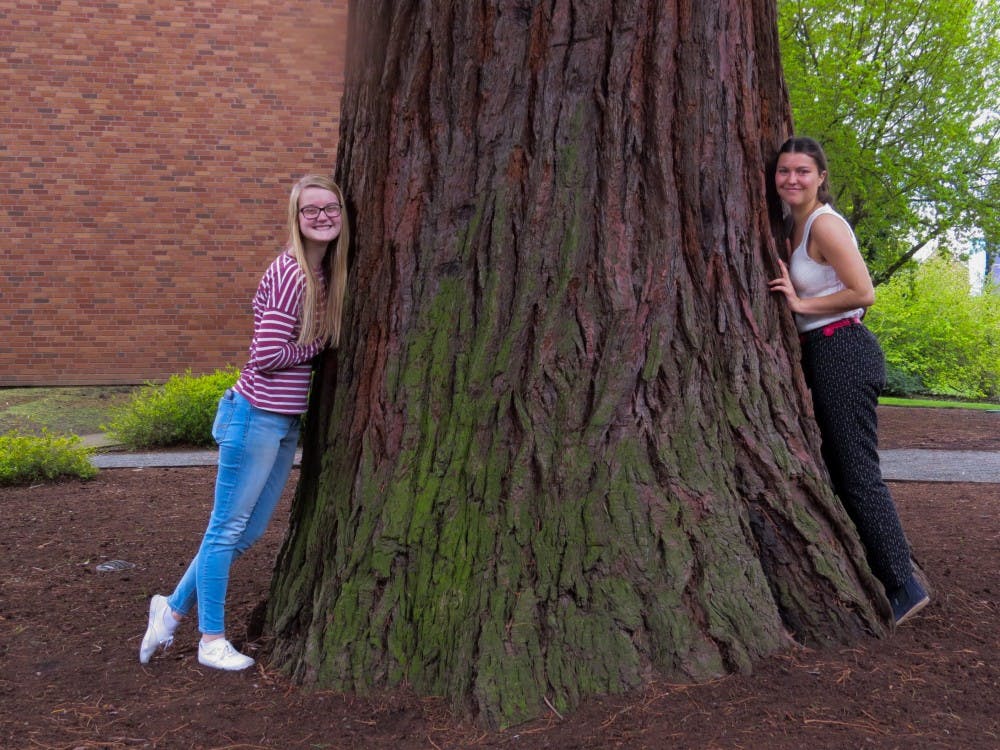Hey, Pilots. Natalie here. As the sun comes out and we start to spend more time outside, I thought I would take this opportunity to learn more about a club on campus that’s doing good for the environment: the College Ecology Club. So I sat down with junior Ruby Beauchamp, the unofficial club president and one of UP’s biggest environmental advocates.
According to some research conducted by Fast Company, around 76 percent of Generation Z is concerned about human impact on the planet and believe they can operate as a change agent. Beauchamp herself has always seen things through an ecological lens and finds herself taking an environmental approach to her day-to-day decisions and her work in the classroom.
“I’ve always been environmentally conscious,” Beauchamp said. “By that, I recognize that humanity is not separate from nature, and everything I do is directly connected to a natural process, no matter how big or small.”
Many students on campus may also know Beauchamp through Eco Action, which is an on-campus campaign that she created during a qualitative research project in a communication class. What came from the project was working together with College Ecology Club and ASUP to integrate sustainability into the UP community.
“It’s a shared meaning kind of thing,” Beauchamp said. “It’s supposed to work through people pledging to take Eco Action. Any person, any department, any entity on campus can pledge to take Eco Action and that just means they are choosing to go down the path of being more sustainable.”
Beauchamp recognizes that there’s a general disconnect between humanity and the environment right now, and Eco Action tries to educate people that you can be an advocate for the environment by being an advocate for yourself. She said it’s important for individuals to work together to change how institutions interact with sustainability.
“The biggest impact an individual can have is changing the institutions and the systems that they’re apart of,” Beauchamp said. “It’s recognizing that you are part of a system and you are an agent of change.”
In parallel with leadership roles in several other on-campus clubs, Beauchamp inherited the College Ecology Club when previous leaders left, and she is now focusing on nurturing younger members of the club to create a foundation that will be sustainable for years to come (no pun intended).
While she is transitioning out of a leadership role in the club for next year, Beauchamp still sees the importance of the club’s presence on campus and is working to make sure its leaders are fully equipped to continue growing the club as a whole.
“The role of College Ecology Club on campus is to raise awareness of environmental issues and do so in a way that gives students and the UP community a sense of agency, which I think is really important,” Beauchamp said.
With spreading environmental awareness at its core, the club has gone about executing their vision through hosting various events, coordinating volunteer activities and increasing overall visibility of sustainability on campus via campaigns and partnerships with other groups. Two of the clubs biggest events this year were Fix it UP, which happened periodically throughout the year, and the Fall Food Festival, which happened in the fall semester.
At Fix it UP, one of Beauchamp’s favorite events, members of the UP community can bring broken items to a group of volunteers to have it fixed, whether it be sharpening your kitchen knives or sewing a piece of clothing instead of throwing it away. At the Fall Food Fest, the College Ecology Club screened a documentary and had seasonal, local food catered by Bon App.
In addition to these two events, College Ecology Club also partnered with the ASUP Sustainability Committee earlier in April to host Earth Week, which featured events like the Sustainability and Innovation fair and a speaker from the Factory Farming Awareness Coalition.
While getting involved with the College Ecology Club or other sustainability efforts on campus can be a great first step in making positive change for the environment, Beauchamp also has a few tips for being a better ecological advocate.
- Talk about it. There is no better way to help the environment than educating yourself and others about the issues at hand and working together to find solutions.
- Believe in yourself. See yourself as a force of nature, and realize that you are capable of helping the environment through almost anything you do.
- Consider the environment in all decision making. Whether it’s what you eat for breakfast, how you get to school or even what field you choose for your career, make the environment a factor.
Natalie Nygren is the community engagement editor for The Beacon. She can be reached at nygren20@up.edu.








